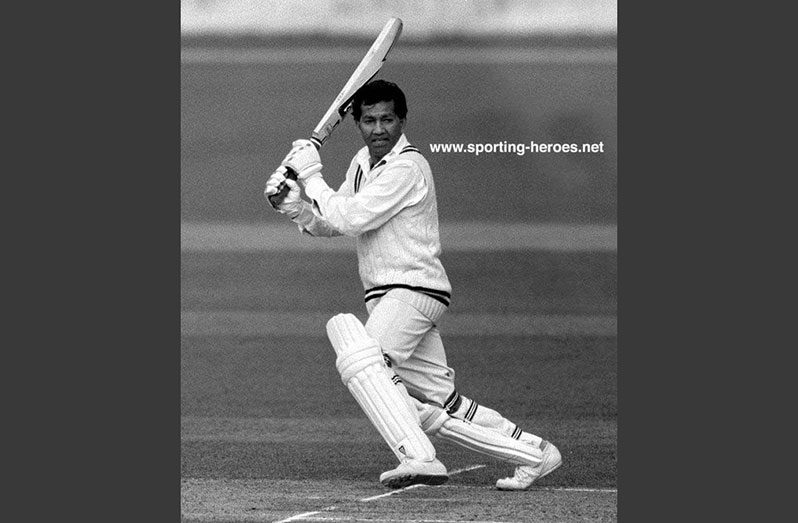By Edwin Seeraj
WEDNESDAY (April 6, 2022) marked 50 years since the ‘Little Master’ Alvin Kallicharran made his Test debut against the visiting New Zealanders at the famous Georgetown Cricket Club (GCC) ground, Bourda in the fourth Test of the five-match series.
The West Indies had contested three Test series against New Zealand before – all in New Zealand – winning 2-0 in 1951-52; 3-1 in 1955-56 and sharing the honours 1-1 in 1968-69.
The first three Tests of the 1972 contest in the Caribbean had all been drawn with the highlights coming in the opening fixture in Jamaica where Lawrence Rowe wrote his name in the record books with classical innings of 214 and 100 not out on debut, Roy Fredericks cracked his maiden Test hundred (163) and the New Zealand opener Glen Turner carried his bat for 223 in the first innings.
Prior the fourth Test, Guyana and New Zealand were engaged in battle at Bourda in a practice encounter during which Turner compiled 259, his third double century on the tour. He had reached the landmark against the President’s XI in Jamaica on the eve of the first Test and Kallicharran also fashioned a hundred.
For the Bourda Test the West Indies made four changes to the team that had played the previous game in Barbados. The batters Joey Carew and Maurice Foster together with bowlers Inshan Ali and Grayson Shillingford made way for the returning Clive Lloyd and three debutants – the Barbadian pair of opener Geoffrey Greenidge and off-spinner Tony Howard, and of course Kallicharran.
The West Indies skipper Garry Sobers won the toss and elected to bat but rain interruptions and a bottle-throwing incident precipitated by the run-out of Clive Lloyd combined to restrict the home team to 201 for four at the end of the opening day’s play with both Charlie Davis and Kallicharran, batting at number six in the order, unbeaten on 14.
On the second day the West Indies crawled to 310 for seven, adding only 109 runs for the loss of three wickets as rain and an ultra-cautious approach led to a painstaking day’s play. However, Kallicharran was not overwhelmed by the disruptions and ended with an undefeated 59, in the process adding 59 for the fifth wicket with Davis and 61 for the seventh wicket with Holford.
Sobers batted for one hour into day three no doubt with the intention of giving Kallicharran the opportunity to garner the coveted debut ton. He duly obliged, getting the required 41 runs in 60 minutes finishing on an unbeaten 100 as the innings, which encompassed 135 overs, closed at 365 for seven. Greenidge’s 50, Lloyd’s 43 and Bruce Taylor’s 3 for 105 off 37 overs were also commendable efforts.
Kallicharran’s innings, stretched over the three-day period, included seven fours and a six and when he got to the century-landmark he joined an elite club of seven West Indians who had done so in their debut Test and only the second Guyanese after Bruce Pairaudeau against India in Trinidad in 1953 who had achieved the defeat.
The rest of the game was noted for a monstrous first-wicket stand of 387 between Turner and Terry Jarvis (currently the fourth highest opening stand in the history of Test cricket) as the West Indian bowlers toiled manfully on a featherbed of a track.
The visitors closed day four on 410 for one and declared at 543 for three on the final day with Turner contributing a studious 259 – the highest Test score at Bourda – and Jarvis 182, his only Test century.
The spinners Howard (62-16-140-2) and Holford (54-24-78-1) bowled marathon spells in an innings that closed after 268 overs. Then the West Indian openers progressed to 86 without loss as the match ended in a dismal draw.
This was Howard’s only Test-match outing while Greenidge played four others but never topped the 50-run mark again. However, Kallicharran fulfilled all his early promise and in fact cracked another hundred (101) in his very next innings – the first innings of the fifth and final Test of the series – at the Queen’s Park Oval, Trinidad.
All told, he played 66 Tests between 1972 and 1981 aggregating 4,399 runs at an average of 44.43 runs per innings hitting 12 centuries (and eight other scores in the 90s). He struck his highest Test score of 187 against India in Mumbai in 1978-79 when he was captain in one of nine matches at the height of the Kerry Packer affair.
In his prime, a left-handed batter, exceptionally excellent against both pace and spin, Kallicharran now resides in England and occasionally turns out for Masters tournaments and coaching stints at the age of 73.





.jpg)








